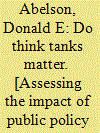| Srl | Item |
| 1 |
ID:
006210


|
|
|
|
|
| Publication |
Houndmills, macmillan Press, 1996.
|
| Description |
xii, 208p.
|
| Standard Number |
0333649443
|
|
|
|
|
|
|
|
|
|
|
|
Copies: C:1/I:0,R:0,Q:0
Circulation
| Accession# | Call# | Current Location | Status | Policy | Location |
| 037268 | 327.73/ABE 037268 | Main | On Shelf | General | |
|
|
|
|
| 2 |
ID:
076188


|
|
|
|
|
| Publication |
Montreal, McGill-Queen's University, 2002.
|
| Description |
xiv, 251p.
|
| Standard Number |
9780773523166
|
|
|
|
|
|
|
|
|
|
|
|
Copies: C:1/I:0,R:0,Q:0
Circulation
| Accession# | Call# | Current Location | Status | Policy | Location |
| 052403 | 320.6/ABE 052403 | Main | On Shelf | General | |
|
|
|
|
| 3 |
ID:
131419


|
|
|
|
|
| Publication |
2014.
|
| Summary/Abstract |
The rise of think-tanks in the United States, in Europe and around the world has generated considerable scholarly attention in recent years. Much of this interest has been fuelled by the widespread belief that these institutions have come to play an increasingly influential role in shaping both public opinion and the domestic and foreign policy preferences and choices of high-level decision-makers. This perception was reinforced when several think-tanks with close ties to the administrations of President George W. Bush and Prime Minister Tony Blair advocated a far more muscular posture towards Iraq in the months and years following the events of 9/1ya. As think-tanks on both sides of the Atlantic continue their efforts to become more entrenched in the policy-making process, scholars are beginning to pay closer attention to how these institutions, established ostensibly to engage in policy research, have become even more adept at political advocacy. Not surprisingly, as think-tanks have devoted more resources to affecting policy change, speculation about how much or little influence they wield has become more intense. The purpose of this article is to explore the evolution and transformation of foreign affairs think-tanks in North America and Europe since the late nineteenth and early twentieth centuries and to highlight, by relying on specific foreign and defence policy issues, the extent to which a handful of think-tanks have been able to become important fixtures in the policy-making community.
|
|
|
|
|
|
|
|
|
|
|
|
|
|
|
|